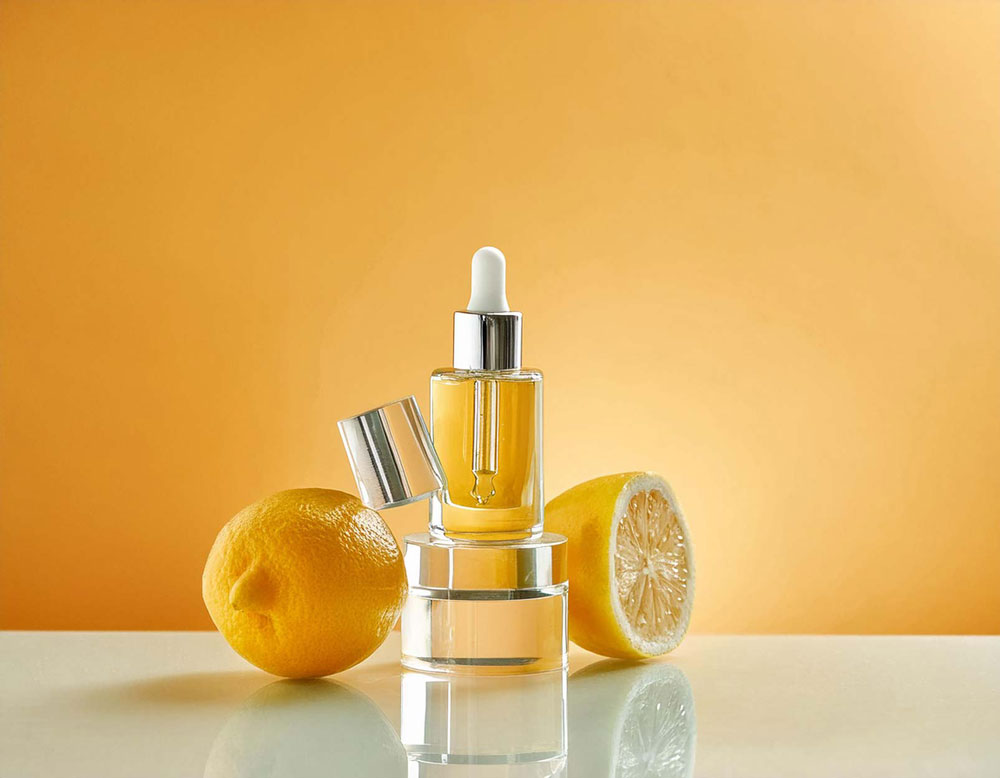In the world of cosmeceuticals, there has been rising interest and buzz about Vitamin C Serums. This topical serum has been recommended as must have in your daily skin care routine by dermatologists and beauty enthusiasts. Promising brighter, more even-toned skin, reduced signs of aging, and enhanced protection against environmental damage, Vitamin C Serums seem to be the miracle product we’ve all been waiting for.
Whether you’re a skincare novice or a seasoned aficionado, The Best Vitamin C Serum will illuminate the path to radiant, healthy skin. But what’s behind all the hype and why has this powerful antioxidant captured the hearts and minds of so many?
Let’s explore in detail about the science behind vitamin C, its research backed benefits and help you find the perfect fit for your skin type and concerns.
Article Contents
- The Science behind Vitamin C and its Skincare Benefits
- Topical Vitamin C: The Stability and Concentration you need to know
- Application Matters: How to get most out of your Vitamin C Serum?
- Finding the Best Vitamin C Serum for your skin type
- Conclusion
- Frequently asked questions (FAQs)
The Science Behind Vitamin C and its Skincare Benefits
Vitamin C is the most common antioxidant found in human skin. Unlike plants and some animals, humans cannot produce vitamin C because they lack the enzyme L-glucono-gamma lactone oxidase. It is consumed from natural sources like citrus fruits and green leafy vegetables.

Despite consuming vitamin C from natural sources and high doses of oral supplements, only a small amount actually reaches the skin. Therefore, we need external sources such as topical vitamin C in skincare products.
Topical Vitamin C offers numerous benefits, including anti-aging effects, reduction of pigmentation, and protection against sun damage, making it a valuable addition to any skincare routine for healthier, brighter, and more youthful-looking skin.
Here is a list of skin care benefits of Vitamin C for healthy and radiant skin:
- Shields against Environmental damage: Vitamin C acts as a potent antioxidant, neutralizing oxidative stress from sun exposure, pollution, and smoking to protect skin integrity.
- Boosts collagen production: Crucial for collagen biosynthesis, Vitamin C stabilizes and enhances collagen levels, promoting improved skin elasticity and texture.
- Brightens and reduces aging signs: Vitamin C supports collagen synthesis, reducing wrinkles and enhancing skin firmness for a smoother, more youthful appearance.
- Protects against UV Damage: Vitamin C neutralizes free radicals induced by UV exposure, reducing sunburn and supporting overall skin protection.
- Targets Hyperpigmentation: By inhibiting melanin production, Vitamin C diminishes dark spots and improves uneven skin tone, proven effective in treating conditions like melasma.
- Reduces Inflammation: Vitamin C’s anti-inflammatory properties aid in managing conditions such as acne and rosacea, promoting healing and preventing post-inflammatory hyperpigmentation.
- Enhances Radiance and Texture: Protecting collagen and elastin, Vitamin C boosts skin elasticity and texture, enhancing natural radiance and luminosity.
- Restores Vitamin E Levels: Vitamin C replenishes Vitamin E, reinforcing antioxidant defenses against oxidative stress and maintaining skin health.
- Supports Skin Barrier Function: Vitamin C promotes the production of skin lipids crucial for maintaining the skin’s protective barrier and preventing moisture loss.
- Improves Sagging Skin: By replenishing collagen and elastin depleted by aging and oxidative stress, Vitamin C enhances skin tightness and reduces sagging.
Topical Vitamin C: The Stability and Concentration you need to know
Vitamin C comes in various active forms, with L-ascorbic acid being the most biologically active and extensively studied for its benefits. However, due to its hydrophilic and unstable nature, L-ascorbic acid has limited skin penetration ability. Maintaining the pH below 3.5, enhance the efficacy of L-ascorbic acid, making it stable and more permeable in skin. Other common stable forms of topical Vitamin C includes ascorbyl-6-palmitate and magnesium ascorbyl phosphate (MAP), both of which are lipophilic and esterified, making them stable at neutral pH.

Clinically, the effectiveness of Vitamin C serum correlates with its concentration. The ideal concentration of Vitamin C is higher than 8% to be biologically effective. Effective Vitamin C products typically range from 10 to 20% concentration. Concentrations above 20 percent may not offer additional benefits and could potentially cause skin irritation.
After reaching peak concentration, its half-life in the skin is approximately 4 days. Consistent application every 8 hours helps maintain a reservoir of Vitamin C for optimal photoprotection, especially after exposure to UV light rather than beforehand. Therefore, formulations with optimal concentrations help to achieve the desired skincare benefits of vitamin C.
Application Matters: How to get most out of your Vitamin C Serum?
A Vitamin C serum has been proven effective to enhance your skin’s health and appearance, however, following some essential tips and skin care habits can help maximize the benefits of your Vitamin C serum.
Here are some tips to help you get the most out of your Vitamin C serum:

- Cleanse your face thoroughly before applying any skincare products to ensure your skin is ready to absorb the serum effectively.
- Always apply the Vitamin C serum onto slightly damp skin using just a few drops to cover your entire face and neck. Vitamin C is potent, so minimal application is sufficient.
- Gently pat or massage the serum into your skin using upward motions, allowing it a few minutes to fully absorb before applying additional skincare products.
- Store your serum in an air-tight, opaque container at a cool, dark place away from sunlight to preserve its potency over time
- Incorporate your Vitamin C serum into both your morning and night skincare routines and use it consistently for long-term benefits.
- Enhance its effectiveness by combining the serum with sunscreen during the day to provide added protection against UV damage.
- Monitor your skin for any signs of irritation and adjust usage accordingly. For personalized advice tailored to your skin type and concerns, consult a dermatologist.
- If you have sensitive skin, start using a vitamin C serum with a lower concentration (10-15%) and gradually increase as your skin builds tolerance.
- Look for stable formulations that include supporting antioxidants like vitamin E and tranexamic acid to enhance efficacy.
- Consider serums with additional ingredients that address specific skin concerns such as dryness, dullness, uneven skin tone, acne and dark spots.
Finding the Best Vitamin C Serum for your skin type
Integrating a the best Vitamin C serum into your skincare regimen can yield impressive benefits, including enhanced skin brightness, improved texture, and diminished signs of aging. However, selecting the ideal serum amidst numerous options can be challenging.
Here, I’ve outlined key criteria to guide you in choosing the perfect Vitamin C serum tailored to your specific skincare requirements. A perfect and best Vitamin C serum embodies following qualities:
- Contains stable Vitamin C derivatives that effortlessly penetrate the skin’s layers
- Provides Vitamin C in concentrations between 10-20% for noticeable skin benefits
- Includes additional components that makes it suitable to various skin types—whether sensitive, oily, dry, or combination
- Incorporates supporting antioxidants like vitamin E to stabilize Vitamin C, enhancing its antioxidant properties against environmental stressors.
- Should have a pleasant texture and feel on the skin, absorbing well without leaving a sticky or greasy residue.
- Shows evident improvements in skin tone, texture, and overall radiance with consistent use over specified timeframes.
- Should be backed by clinical studies or evidences, demonstrating its efficacy and safety in achieving promised results.
The best Vitamin C serum exemplifies the qualities essential for effective skincare.
One of my preferred and stand out choice is BioBird Vitamin C serum, which features a stable formulation of ethyl-ascorbic acid at an effective concentration known to deliver visible results. Its advanced formulation includes transexamic acid, rice ferment extract, alpha arbutin and niacinamide, which not only stabilizes the Vitamin C but also enhances its antioxidant potency, offering robust protection against environmental aggressors. This clinically proven serum visibly improves skin tone, reduces hyperpigmentation, fights photodamage and improves appearance of fine line and wrinkles over time.
Conclusion
Vitamin C is a pivotal ingredient in modern skincare routines, offering a spectrum of benefits from antioxidant protection to collagen stimulation and skin brightening. Its effectiveness hinges on stable formulations, adequate concentration, and proper application techniques to maximize absorption and efficacy.
Embrace the best Vitamin C serum as your skin care partner in combating oxidative stress, refining skin texture, and enhancing overall radiance.
Frequently asked Questions (FAQs)
1) Can I use vitamin C serum every day?
Yes, vitamin C serum can typically be used daily as part of your morning and night skincare routine. Always apply sunscreen after using vitamin C serum in the morning.
2) What are the side effects of vitamin C serum?
Topical Vitamin C is generally safe for daily use. Minor side effects like dryness, stinging and irritation may occur but are manageable with moisturizers. Vitamin C has a high safety profile, and should be used in optimal recommended range of 10-20%.
3) How many drops of vitamin C serum should I use?
Generally, 3-5 drops of Vitamin C serum are sufficient to cover the face and neck area. You should always read the product label and use as directed.
4) What are the precautions for vitamin C serum?
General precautions for using vitamin C serum include patch testing before use, starting with lower concentrations for sensitive skin, and using sunscreen during the day due to increased skin sensitivity.
5) How much vitamin C serum is safe?
Vitamin C serums with concentrations between 10-20% are generally considered safe and effective for most individuals. However, you can adjust usage based on your skin’s tolerance and consult with a dermatologist if unsure.





